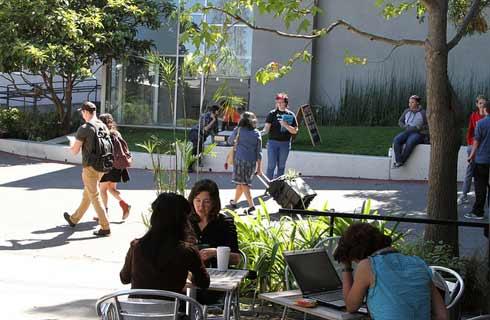中学教育文学士-化学
Bachelor of Arts in Secondary Education - Chemistry

学历文凭
Bachelor Degree

专业院系
Chemistry

开学时间

课程时长

课程学费

国际学生入学条件
Academic credentials – Submit official copies of academic credentials (mark sheets, score cards, transcripts, graduation certificates, degree certificates) with literal English translation if necessary. All previous academic work must be included, and a syllabus of coursework with English translation should be provided. Academic transcripts and proof of graduation from secondary school.
Statement of Purpose
Any other documentation required by the academic program.
International students are required to establish proof of adequate English proficiency as part of the admission process
TOEFL (Test of English as a Foreign Language) with a minimum score of 61
IELTS (International English Language Testing System with a score minimum of 5.5 with 5.5 in each band
Statement of Purpose
Any other documentation required by the academic program.
International students are required to establish proof of adequate English proficiency as part of the admission process
TOEFL (Test of English as a Foreign Language) with a minimum score of 61
IELTS (International English Language Testing System with a score minimum of 5.5 with 5.5 in each band
IDP—雅思考试联合主办方

雅思考试总分
5.5
- 雅思总分:5.5
- 托福网考总分:61
- 托福笔试总分:160
- 其他语言考试:PTE (Pearson Test of English) with a minimum score of 44
CRICOS代码:
申请截止日期: 请与IDP联系 以获取详细信息。
课程简介
教育学院于1954年正式成立,是一个单独的学术部门,是堪萨斯城大学自1940年以来就参与专业教育的结果。艺术丰富,大多数班级在夏季和晚上进行。1952年建立了基础教育的本科专业,堪萨斯大学第一个城市博士学位课程是博士学位。于1954年在学校的组织下正式成立。自1954年以来,该学校已发展为包括19个课程的三个学科部门,提供文学学士,艺术硕士,教育专家,教育博士学位和医生<哲学学位课程。与生物科学学院,音乐学院和艺术与科学学院合作提供了多个学位和认证课程。教育学院的任务是招募,准备和支持优秀的教师,心理健康
The Bachelor of Arts in Secondary Education includes professional coursework in teacher education as well as coursework in a selected content area corresponding to the desired teacher certification. Typically, between 30 and 50 hours of content area coursework is required to attain the subject major/certification. Students must consult with an advisor to determine specific requirements. Students who already have a bachelor's degree may be required to complete content area requirements that were not part of their prior degree program in addition to the professional education requirements.<br><br>Students graduating from this program will: 1. Understand how learners grow and develop, recognizing that patterns of learning and development vary individually within and across the cognitive, linguistic, social, emotional, and physical areas, and designs and implements developmentally appropriate and challenging learning experiences. 2. Understand individual differences and diverse cultures and communities to ensure inclusive learning environments that enable each learner to meet high standards. 3. Work with others to create environments that support individual and collaborative learning, and that encourage positive social interaction, active engagement in learning, and self-motivation. 4. Understand the central concepts, tools of inquiry, and structures of the discipline(s) he or she teaches and creates learning experiences that make these aspects of the discipline accessible and meaningful for learners to assure mastery of the content. 5. Understand how to connect concepts and use differing perspectives to engage learners in critical thinking, creativity, and collaborative problem solving related to authentic local and global issues. 6. Understand and use multiple methods of assessment to engage learners in their own growth, to monitor learner progress, and to guide the teacher's and learner's decision making. 7. Plan instruction that supports every student in meeting rigorous learning goals by drawing upon knowledge of content areas, curriculum, cross-disciplinary skills, and pedagogy, as well as knowledge of learners and the community context. 8. Understand and use a variety of instructional strategies to encourage learners to develop deep understanding of content areas and their connections, and to build skills to apply knowledge in meaningful ways. 9. Engage in ongoing professional learning and use evidence to continually evaluate their practice, particularly the effects of their choices and actions on others (learners, families, other professionals, and the community), and adapt practice to meet the needs of each learner. 10. Seek appropriate leadership roles and opportunities to take responsibility for student learning, to collaborate with learners, families, colleagues, other school professionals, and community members to ensure learner growth, and to advance the profession.
The Bachelor of Arts in Secondary Education includes professional coursework in teacher education as well as coursework in a selected content area corresponding to the desired teacher certification. Typically, between 30 and 50 hours of content area coursework is required to attain the subject major/certification. Students must consult with an advisor to determine specific requirements. Students who already have a bachelor's degree may be required to complete content area requirements that were not part of their prior degree program in addition to the professional education requirements.<br><br>Students graduating from this program will: 1. Understand how learners grow and develop, recognizing that patterns of learning and development vary individually within and across the cognitive, linguistic, social, emotional, and physical areas, and designs and implements developmentally appropriate and challenging learning experiences. 2. Understand individual differences and diverse cultures and communities to ensure inclusive learning environments that enable each learner to meet high standards. 3. Work with others to create environments that support individual and collaborative learning, and that encourage positive social interaction, active engagement in learning, and self-motivation. 4. Understand the central concepts, tools of inquiry, and structures of the discipline(s) he or she teaches and creates learning experiences that make these aspects of the discipline accessible and meaningful for learners to assure mastery of the content. 5. Understand how to connect concepts and use differing perspectives to engage learners in critical thinking, creativity, and collaborative problem solving related to authentic local and global issues. 6. Understand and use multiple methods of assessment to engage learners in their own growth, to monitor learner progress, and to guide the teacher's and learner's decision making. 7. Plan instruction that supports every student in meeting rigorous learning goals by drawing upon knowledge of content areas, curriculum, cross-disciplinary skills, and pedagogy, as well as knowledge of learners and the community context. 8. Understand and use a variety of instructional strategies to encourage learners to develop deep understanding of content areas and their connections, and to build skills to apply knowledge in meaningful ways. 9. Engage in ongoing professional learning and use evidence to continually evaluate their practice, particularly the effects of their choices and actions on others (learners, families, other professionals, and the community), and adapt practice to meet the needs of each learner. 10. Seek appropriate leadership roles and opportunities to take responsibility for student learning, to collaborate with learners, families, colleagues, other school professionals, and community members to ensure learner growth, and to advance the profession.
相关申请
 预科
预科 奖学金
奖学金 实习机会
实习机会 在校学习
在校学习 跨境学习
跨境学习 校园授课-线上开始
校园授课-线上开始 在线/远程学习
在线/远程学习
开学时间&学费
学费信息仅供参考,请与IDP联系以获取详细信息
| 开学时间 | 时长 | 学费 | 地点 |
|---|---|---|---|
| 暂无 | 暂无 | 暂无 | 暂无 |
本校相关课程

音乐文学学士
学历文凭
Bachelor Degree
开学日期
课程费用总额


生物学文学士/医学博士
学历文凭
Combined Bachelor's / Doctoral Degree
开学日期
课程费用总额


城市规划与设计学士学位
学历文凭
Bachelor Degree
开学日期
课程费用总额


城市研究文学学士学位
学历文凭
Bachelor Degree
开学日期
课程费用总额


戏剧艺术学士学位
学历文凭
Bachelor Degree
开学日期
课程费用总额


工作室艺术学士学位
学历文凭
Bachelor Degree
开学日期
课程费用总额

其他相关课程

化学哲学博士[量子信息合作计划]
 滑铁卢大学
滑铁卢大学学历文凭
Ph.D.
开学日期
课程费用总额


化学理学硕士[量子计算合作计划]
 滑铁卢大学
滑铁卢大学学历文凭
Masters Degree
开学日期
课程费用总额


化学哲学博士
 滑铁卢大学
滑铁卢大学学历文凭
Ph.D.
开学日期
课程费用总额


化学理学硕士
 滑铁卢大学
滑铁卢大学学历文凭
Masters Degree
开学日期
课程费用总额


化学理学士(荣誉学位)
 滑铁卢大学
滑铁卢大学学历文凭
Bachelor Degree with Honours
开学日期
课程费用总额


化学科学硕士
 劳伦森大学
劳伦森大学学历文凭
Masters Degree
开学日期
课程费用总额










 美国
美国
